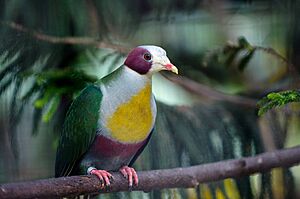Yellow-breasted fruit dove facts for kids
Quick facts for kids Yellow-breasted fruit dove |
|
|---|---|
 |
|
| Adult nominate in captivity | |
| Conservation status | |
| Scientific classification |
|
| Kingdom: | Animalia |
| Phylum: | Chordata |
| Class: | Aves |
| Order: | Columbiformes |
| Family: | Columbidae |
| Genus: | Ptilinopus |
| Species: |
P. occipitalis
|
| Binomial name | |
| Ptilinopus occipitalis G. R. Gray, 1844
|
|
| Script error: The function "autoWithCaption" does not exist. | |
Script error: No such module "Check for conflicting parameters".
The yellow-breasted fruit dove (Ptilinopus occipitalis), also called balorinay in some local areas, is a beautiful bird. It belongs to the Columbidae family, which includes doves and pigeons. This special bird lives only in the Philippines, meaning it is endemic there.
You can find the yellow-breasted fruit dove in tropical moist lowland forests. Even though it is currently listed as "Least Concern" by the IUCN (meaning it's not in immediate danger of disappearing), its numbers are going down. This is mainly because its forest home is shrinking. Also, some people hunt these doves or try to catch them to sell, which is against the law.
In the Philippines, it is against the law (under RA 9147) to hunt, catch, or keep yellow-breasted fruit doves. This law helps protect these unique birds.
About This Dove's Family
The yellow-breasted fruit dove is part of a large group of birds called Ptilinopus. There are more than 50 different kinds of fruit doves! Among its closest relatives are the red-eared fruit dove and the Lompobattang fruit dove.
The scientific name Ptilinopus occipitalis has a cool meaning. Ptilinopus comes from ancient Greek words meaning "feather" and "foot." The word occipitalis comes from Latin and means "of the back of the head." Another name for this bird is the sulphur-breasted fruit dove.
Different Kinds of Yellow-breasted Fruit Doves
Scientists recognize two slightly different types, or subspecies, of the yellow-breasted fruit dove. These types have small differences in their size and how their feathers look.
- P. o. occipitalis: This type is found in the northern and central parts of the Philippines. You can see it from southern Luzon down to islands like Negros, Bohol, and Leyte.
- P. o. incognitus: This type lives in the southeastern Philippines. It can be found in the mountains of islands such as Dinagat, Camiguin, Mindanao, and Basilan.
 | Mary Eliza Mahoney |
 | Susie King Taylor |
 | Ida Gray |
 | Eliza Ann Grier |


